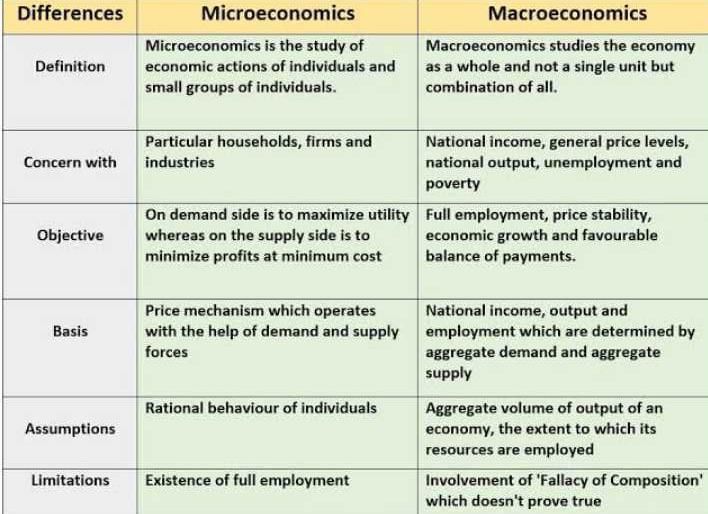Class 12 Exam > Class 12 Questions > difference between micro economic and macro e...
Start Learning for Free
difference between micro economic and macro economic
Most Upvoted Answer
difference between micro economic and macro economic

Community Answer
difference between micro economic and macro economic
Microeconomics vs Macroeconomics
Microeconomics and macroeconomics are two different branches of economics that focus on different aspects of the economy. While microeconomics deals with individual economic agents, such as households, firms, and markets, macroeconomics deals with the economy as a whole, including the overall level of output, employment, and inflation.
Microeconomics
Microeconomics is concerned with the behavior of individual economic agents and how they interact in markets. It focuses on the decisions made by households and firms, and how these decisions affect the prices of goods and services in the market. Microeconomic analysis also considers the factors that influence the demand and supply of goods and services, including consumer preferences, production technology, and market structure.
Some of the key topics covered in microeconomics include:
- Theory of consumer behavior and demand
- Theory of production and costs
- Market structure and competition
- Price determination and market equilibrium
- Externalities and public goods
Macroeconomics
Macroeconomics is concerned with the overall performance of the economy, including the level of output, employment, and inflation. It examines the economy as a whole and considers the factors that influence its overall performance. Macroeconomic analysis focuses on the behavior of aggregate economic variables, such as gross domestic product (GDP), inflation, and unemployment.
Some of the key topics covered in macroeconomics include:
- National income accounting
- Theories of economic growth
- Business cycles and economic fluctuations
- Monetary and fiscal policy
- International trade and finance
Conclusion
In conclusion, microeconomics and macroeconomics are two different branches of economics that focus on different aspects of the economy. While microeconomics deals with individual economic agents, such as households, firms, and markets, macroeconomics deals with the economy as a whole, including the overall level of output, employment, and inflation. Understanding the differences between these two branches of economics is essential for anyone wishing to gain a deeper understanding of the economy and its functioning.
Microeconomics and macroeconomics are two different branches of economics that focus on different aspects of the economy. While microeconomics deals with individual economic agents, such as households, firms, and markets, macroeconomics deals with the economy as a whole, including the overall level of output, employment, and inflation.
Microeconomics
Microeconomics is concerned with the behavior of individual economic agents and how they interact in markets. It focuses on the decisions made by households and firms, and how these decisions affect the prices of goods and services in the market. Microeconomic analysis also considers the factors that influence the demand and supply of goods and services, including consumer preferences, production technology, and market structure.
Some of the key topics covered in microeconomics include:
- Theory of consumer behavior and demand
- Theory of production and costs
- Market structure and competition
- Price determination and market equilibrium
- Externalities and public goods
Macroeconomics
Macroeconomics is concerned with the overall performance of the economy, including the level of output, employment, and inflation. It examines the economy as a whole and considers the factors that influence its overall performance. Macroeconomic analysis focuses on the behavior of aggregate economic variables, such as gross domestic product (GDP), inflation, and unemployment.
Some of the key topics covered in macroeconomics include:
- National income accounting
- Theories of economic growth
- Business cycles and economic fluctuations
- Monetary and fiscal policy
- International trade and finance
Conclusion
In conclusion, microeconomics and macroeconomics are two different branches of economics that focus on different aspects of the economy. While microeconomics deals with individual economic agents, such as households, firms, and markets, macroeconomics deals with the economy as a whole, including the overall level of output, employment, and inflation. Understanding the differences between these two branches of economics is essential for anyone wishing to gain a deeper understanding of the economy and its functioning.

|
Explore Courses for Class 12 exam
|

|
Similar Class 12 Doubts
Question Description
difference between micro economic and macro economic for Class 12 2025 is part of Class 12 preparation. The Question and answers have been prepared according to the Class 12 exam syllabus. Information about difference between micro economic and macro economic covers all topics & solutions for Class 12 2025 Exam. Find important definitions, questions, meanings, examples, exercises and tests below for difference between micro economic and macro economic.
difference between micro economic and macro economic for Class 12 2025 is part of Class 12 preparation. The Question and answers have been prepared according to the Class 12 exam syllabus. Information about difference between micro economic and macro economic covers all topics & solutions for Class 12 2025 Exam. Find important definitions, questions, meanings, examples, exercises and tests below for difference between micro economic and macro economic.
Solutions for difference between micro economic and macro economic in English & in Hindi are available as part of our courses for Class 12.
Download more important topics, notes, lectures and mock test series for Class 12 Exam by signing up for free.
Here you can find the meaning of difference between micro economic and macro economic defined & explained in the simplest way possible. Besides giving the explanation of
difference between micro economic and macro economic, a detailed solution for difference between micro economic and macro economic has been provided alongside types of difference between micro economic and macro economic theory, EduRev gives you an
ample number of questions to practice difference between micro economic and macro economic tests, examples and also practice Class 12 tests.

|
Explore Courses for Class 12 exam
|

|
Signup to solve all Doubts
Signup to see your scores go up within 7 days! Learn & Practice with 1000+ FREE Notes, Videos & Tests.
















